Episodes
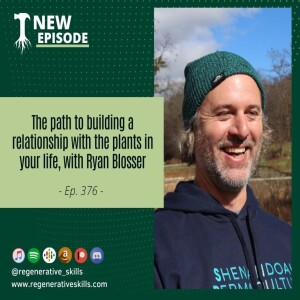
Friday Apr 25, 2025
Friday Apr 25, 2025
In so many previous episodes I’ve spoken with people who’ve explained many nuances and facts about plants and how to incorporate different species of trees, shrubs, grasses, and forbes into your ecosystem. How to manage them in different stages of growth either through active cultivation and soil condition improvement or secondarily through the management of animals or other elements of the human built world, but in this interview we’re going to take a different approach to the vegetal world and consider a beautiful and often overlooked aspect of our connection with plants, and that’s the possibility of creating relationships with them. If that concept seems weird to you, consider that people in all parts of the world all throughout history have cultivated deep interconnected relationships with plants of all kinds. There are connections that heal us, show us our location, signal different soil conditions, nourish, clothe, and protect us. Many cultures reference being able to speak to plants and communicate with them. They can open our consciousness to different states of being and thinking as well, and not only through psychotropic properties.
In this episode I spoke with Ryan Blosser, the co-author along with Trevor Piersol of the new book Mulberries in the Rain: Growing Permaculture Plants for Food and Friendship. The book goes beyond the sphere of most permaculture books that are heavy on design theory and techniques, and speaks about the process of investigation and time investment to build lasting and mutually beneficial relationships with the plants that you cultivate, forage or otherwise cohabitate with. Ryan is also co owner and lead instructor with Shenandoah Permaculture Institute. He is also the Farm Educator with Waynesboro City Schools where he runs Waynesboro Education Farm and is also a former child and family therapist and market farmer.Besides covering practical steps for building a relationship with the plants you come into contact with, much more than other episodes, this conversation is based on stories, both Ryan’s and my own. We talk about adversarial relationships with plants that blossomed into alliances. We trade memories of plant that ground us in place and are connected with who we perceive ourselves to be. Ones that are connected to family, legend and legacy as well as a few we’re still reconciling and exploring but present challenges.
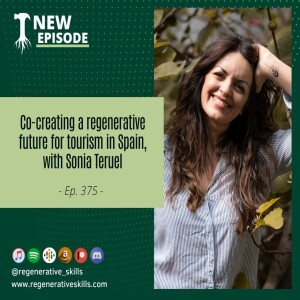
Saturday Apr 19, 2025
Saturday Apr 19, 2025
Today we’ll continue the miniseries I’m building on regenerative tourism. This time we’ll take a close look at the specific context of the country where I live, here in Spain. Spain has been a top global tourist destination since the 60s and the industry that as grown to meet the demand for travel as shaped so much of the country especially the Mediterranean coast and cities like Barcelona, Valencia, and towns that have grown up entirely to cater to a specific type of budget tourism like Benidorm, Salou, and Lloret del Mar.
Yet in recent years there has been a major backlash from the local population protesting irresponsible development, skyrocketing prices, and exemptions from water restrictions directly related to the way tourism is managed. Here to explore these challenges as well as the potential to chart a new course for both hosts and visitors is Sonia Teruel. Sonia helps grassroots initiatives, entrepreneurs and Destination Management Organisations in their transition to a regenerative model in tourism. She is also a consultant, facilitator, and founder at The RegenLAB for Travel. In this conversation we explore the meteoric rise of Spain as a tourist destination and its impact on the communities where visitors concentrate. We look at the challenges that have ignited protests and opposition to the way tourism is managed as well as some of the responses to these issues which may cause bigger problems in the long term. From there we mine Sonia’s experiences as a community conversation facilitator who works to guide collaborative processes that explore the potential for new ways of managing visitors and hosts alike in order to achieve lasting solutions.
Sonia will be the first to admit that these efforts are still in their infancy and case studies of real success over time don’t exist yet in our region, but points to some promising projects to keep an eye on and perhaps emulate as they get established. Though the focus is on the Spanish context, I have no doubt that there are equivalents to many other places around the world where the tourism industry has shaped development and policy for decades, and I hope many of you listening will find inspiration for where you live as well.
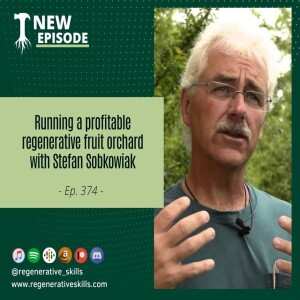
Wednesday Apr 09, 2025
Wednesday Apr 09, 2025
Welcome back to another interview from the skill exchange calls that I’ve been running with Climate Farmers for our regenerative farming network in Europe.
In this session I had the good fortune of introducing Stefan Sobkowiak to our group. Many of you who’ve been listening to this show for a while will remember the last interview I did with Stefan in the last season during the series on agroforestry. Stefan is one of my favorite sources for practical and honest techniques for managing the whole ecology of an orchard from propagating new tree species through maintenance, pest management, harvesting and even processing and marketing your products. His film, the Permaculture Orchard has help people around the world to transition towards diversified, resilient, and more profitable models of running their tree crop businesses. His YouTube channel goes even more in depth as he’s always creating videos about the innovations and even struggles that are going on at his orchard Miracle Farm in Canada.
In this session we cover a lot of ground in a short time.We talk about How to manage pests and diseases by improving soil health and biodiversity in the orchard. How to care for the health of your trees for better yields and profit. Integrating other crops and animals into the system for ecological and economic resilience. And how to adapt common methods to your unique climate and context.
There’s a whole Q&A session that happens after the half hour interview on these skill exchange calls which are exclusive to the Climate Farming network here in Europe. So if you’re interested in attending these calls in person to have your own questions answered by the experts and tap into the growing community of farmers, consultants, and educators around Europe, you can register right now at ClimateFarmers.org
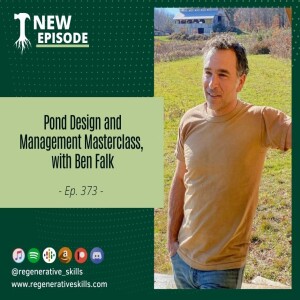
Friday Apr 04, 2025
Friday Apr 04, 2025
At this point I’ve taken a lot of courses and trainings around water management and earthworks, but I’m still always curious to stay up to date on new takes and styles of working with water and shaping the landscape to optimize water capture on the terrain. I’ve talked to Ben Falk a couple of times in the past and I’ve always enjoyed his take on the need to build deep relationships with the systems we design and build, but in the past we never focused on water.In this episode, I reconnect with Ben, and we dive into water management and his new course on pond design and management. Ben explains the comprehensive focus of the course, covering site evaluation, water storage, pond construction, and long-term maintenance. He discusses the significance of water management in permaculture and restoration, addressing key considerations for pond building, such as erosion control and flood mitigation. The conversation also explores the ecological and culinary potential of ponds, emphasizing their role in enhancing microclimates, providing habitat, and offering diverse food sources. Ben shares insights on how ponds benefit both wet and dry climates by replenishing groundwater and managing floodwaters effectively. The episode highlights the importance of small, decentralized water systems and the myriad ecological benefits ponds offer.
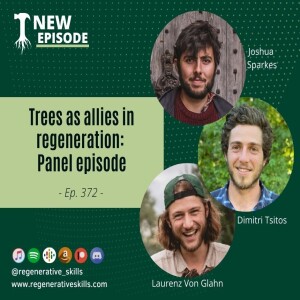
Friday Mar 28, 2025
Friday Mar 28, 2025
Part of the Climate Farmers Academy series, dedicated to facilitating peer-to-peer learning among farmers transitioning toward regenerative management across Europe. In this episode, experienced practitioners from various European regions share their insights and practical advice on integrating agroforestry into diverse farming contexts. The panel includes Lorenz from Germany, Dmitri based in Portugal, and Joshua from England, who discuss topics such as soil health, plant diversity, tree nursery setups, and the financial aspects of regenerative farming. This episode is a must-watch for anyone interested in enhancing farm resilience and implementing regenerative practices with perennial crop systems.
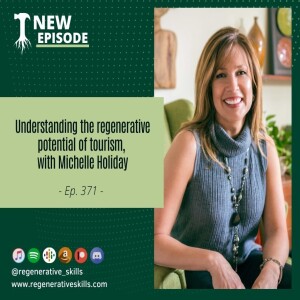
Friday Mar 21, 2025
Friday Mar 21, 2025
Today I’ll be kicking off another little series on a topic that’s new to this show, which is regenerative tourism. Both, I and a number of other friends have been noticing a growing animosity and backlash towards tourism in our communities over the last couple of years. It seems that since the rise of short term rentals, and the post COVID surge of travel, we’re hitting a tipping point in what local communities are willing to put up with as more of their culture and ways of life are over run by outside visitors and the industries that cater to them. Now obviously I’m a foreigner to the place where I live, as are many of my friends in different place around the world, so I want to understand this cultural moment from a number of perspectives. One being how people like myself can go beyond the empty promises of sustainable tourism, and visit new places in a way that actually enriches the culture and identity of those locations, and also the other side, where as host communities we can cultivate a relationship and cater to visitors in a way that incentivises this kind of interaction, and goes beyond the extractive tendencies from both sides. Now I’m very new to the nuisances of this topic, but thankfully my friend Charles Van de Kerkhof who has made this topic his specialty for a number of years has been kind enough to connect me to his contacts and guide the questions and concepts in the interviews of this growing series, and you’ll hear from him directly soon enough. Now this first interview will help to set the tone and offer an overview of what we’re trying to explore here, and I feel very fortunate to have gotten a hold of Michelle Holiday to start us off.
Michelle is an author, facilitator, consultant & researcher, who For the past 2 decades, has supported pioneering clients across a range of sectors, including tourism & agriculture, to enable the transition to more regenerative systems and structures. Michelle’s research & experience are brought together in her book, The Age of Thrivability: Vital Perspectives & Practices for a Better World, as well as more than 100 articles on themes of thrivability & regeneration.In this conversation, Michelle and I start by building an understanding of her term, thrivability as a concept that we set as a foundation for potential. We then look at the current paradigm of tourism and how it can erode both the value of the places that host visitors as well as cheapen the experiences that travelers are looking for. Through examples from our own travels and experiences Michelle and I look through examples of tourism interactions from different places and where opportunities may have been missed. We analyse both the perspective of travelers as well as hosts to build on a concept of thrivability for both, and Michelle shares case studies of where community led discussions have unlocked greater potential than what may lie on the surface.
By the end you’ll hear about ideas and advice on how you, either as a visitor or a host, can break free of the common narrative of extractive tourism and begin to cultivate a relationship with the other that can enrich everyone involved, including the local environment.
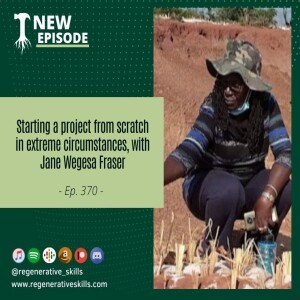
Friday Mar 14, 2025
Friday Mar 14, 2025
Of all the projects that I've watched develop from the beginning, Jane is the example I most enjoy pointing to when people ask for advice on how to get their projects started with limited resources. Her determination, creativitiy, tenacity, and focus on community are blossoming into a real catalyst for change in her region of western Kenya.
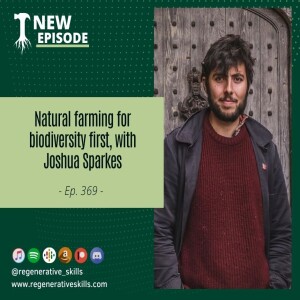
Friday Mar 07, 2025
Friday Mar 07, 2025
I’m really excited to share this conversation with all of you today, because Joshua Sparkes not only has a unique perspective on gardening and food production, he also speaks about these topics from a lot of experience and infectious passion. I’ve spoken to tons of farmers and gardeners on this show, and many of them are experts in permaculture, or market gardening, or native plants, or any other specialty, but in Josh’s case, he’s studied in many parts of the world and learned a range of disciplines that he combines in his own unique way to create a truly inspiring and evolving food production system at Birch farm in the UK, that actually doesn’t focus primarily on food growing at all. Before I let him explain that, let’s start at the beginning. Josh was fortunate to grow up in a wild part of Sussex surrounded by forests and meadows. When he finished school He joined the military and served overseas. He says his childhood was often a place he retreated too during hard times and it made him realise that his love came from nature, and so he’s dedicated the last 15 years to make sure he can do his best to support and protect it through his work, which was the beginning of his journey into Natural Farming. In this episode Josh will explain how attending a horticulture program opened doors to travel and learn from farmers and gardeners around the world and how that has shaped his vision for Birch farm. We explore how putting a main focus on increasing biodiversity has evolved into a wild configuration of plants in a small space which includes trees, and species that most consider weeds and pests as part of an integral system which aims to reach a balance through many multiple interconnections rather than eradication or suppression of certain life forms. Josh also explains how principles of natural farming and syntopic agriculture are married with the need to produce vegetables for a farm store and connected restaurant while also providing unique culinary and sensory experiences for customers. Of all the different food production systems that I’ve heard described on this show, I would say that the vision that Josh describes is the most aligned with my own for my own farm, just with much more knowledge and practical experience.
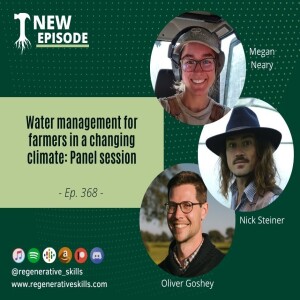
Thursday Mar 06, 2025
Thursday Mar 06, 2025
Welcome to another panel session. I love this format in general, but this panel in particular was a whole lot of fun, because not only did I have my close friends Nick Steiner and Megan Neary on, but I also joined in as a speaker to explore the topic of water management for farmers in a changing climate.
The guiding question we explored was, How can farmers prepare for a changing climate and ensure long-term water resilience? We explored water retention, flood management, and drought resilience—breaking down strategies that help farms thrive despite increasing climate uncertainty.
We started by talking about the key changes farmers should expect in the coming decades and how to assess hydrological health on your farm.
From there we went into practical steps to build a holistic water management strategy, and how to navigate the many options available for water retention.
If you’ve been listening for any amount of time, you’ll know me and my friend Nick as we work closely together and have talked about water cycle restoration and our contracting jobs in creating water retention landscapes in many past episodes. Our good friend Megan Neary is new to this show though. She works with Elemental Ecosystems and the Water Stories team as a project technician. With a background in geology and conservation, Megan specializes in reshaping landscapes to improve soil health, enhance biodiversity, and create decentralized water systems.Now there is a whole Q&A session that I chopped for the podcast version, but if you’re interested you can find it on the Climate Farmer’s Youtube channel.
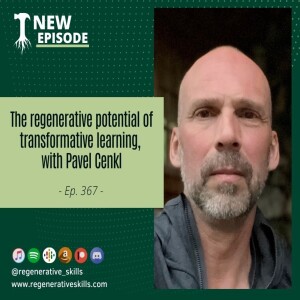
Friday Feb 21, 2025
Friday Feb 21, 2025
Today I want to start a fun new series on a topic that I’ve wanted to explore for quite a while, which is the concept of regenerative education.
I’ve worked as a teacher and educational facilitator in different capacities since the beginning of my career, first in before and after school programs for kids, then as an arts and environmental educator at summer camps, then English as a second language in both South Korea and Guatemala, and in between teaching various technical workshops in natural building, permaculture, ecosystem restoration, the transition journey to regenerative agriculture, and of course water management and water cycle restoration. Every time I engage in these activities I gain huge respect for teachers and the incredible skill and patience it takes to be an effective educational facilitator. Similarly, I want to continue to grow as a teacher and even improve my skills as a student since I’m also always in some sort of course or other at the same time.
I know this is a wide and nuanced topic and so to help me to become oriented to the considerations and scope of what I’m exploring, I reached out to Pavel Cenkl, who is the Academic Dean at Prescott College in Arizona (US) and the Founder of the Regenerative Learning Network. His work focuses on the intersection of transformative learning, community, and ecology and building a more regenerative, resilient, and equitable educational future. He’s also the author of several books including Transformative Learning (with Satish Kumar), “Relational Ecologies: Building Regenerative Community Learning Networks” in Regenerative Ecosystems in the Anthropocene (2023) and “Lessons from the Periphery” in Regenerative Learning (2022). Pavel’s current book in progress is titled Networked Learning: Transforming Higher Education through Distributed Learning.
This conversation weaves from the troubles with traditional or conventional educational models and why they leave so many behind, and increasingly in debt, through alternative models of teaching and the potential that educational institutions really have. We explore the role of technology in learning as well as the things the digital world can’t replace. Pavel also give his take on what makes effective educators and a window into their process of creating learning curriculums that are in line with the concept of regenerative education. This is the first in a series of interviews that I’m in the process of planning so if you have any ideas of what questions I should explore or who I should speak to in upcoming interviews, I encourage you to reach out to me through the Regenerative Skills Discord server.









